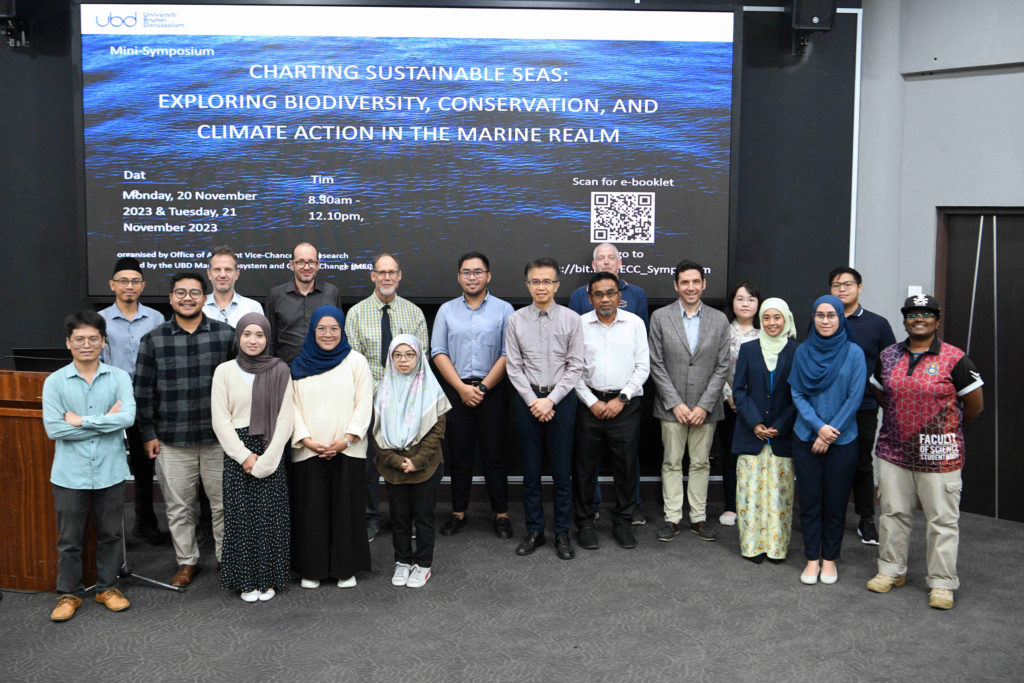Exploring the Depths:
Insights from the MECC Research Group Mini Symposium

The recently concluded ‘Charting Sustainable Seas: Exploring Biodiversity, Conservation and Climate Action in the Marine Realm’ mini symposium proved to be a significant gathering of minds dedicated to exploring the challenges and opportunities associated with preserving our marine ecosystems. Organised by the Office of Assistant Vice-Chancellor (Research) and hosted by the Marine Ecosystem and Climate Change (MECC) Research Group, the event unfolded at Mistubishi Hall, UBD on November 20th and 21st, 2023 from 8:30 am to 12:10 pm, drawing together experts and enthusiasts alike.
Opening the Symposium with a Vision
Dr. Abby Tan, the Assistant Vice-Chancellor (Research), set the tone with an opening speech emphasizing the importance of collaboration in research to make our seas sustainable. The event marked a crucial step in fostering interdisciplinary connections to address the pressing issues facing our oceans.
Highlights: From Biodiversity to Climate-Smart Conservation
The symposium covered a diverse range of topics, starting with David John Marshall’s exploration of the underexplored marine biodiversity of Brunei and the Palawan-North Borneo ecoregion. Marshall addressed the bias in previous studies and highlighted the need for a more comprehensive understanding of marine taxa for effective environmental management and conservation.
Stelios Katsanevakis and Antonios Mazaris provided insights into systematic conservation planning in the marine environment. Their presentations delved into decision support tools for spatial prioritization and the incorporation of climate change considerations. Antonios D. Mazaris introduced a 4D-approach for designing marine protected areas, integrating climate change impacts, emphasizing a three-dimensional, climate-smart approach to protected area networks.
Katsanevakis returned to discuss methods for non-native species detection and impact assessment, using the Mediterranean Sea as an example. The discussion emphasized the need for comprehensive assessment tools to understand the cumulative impacts of invasive alien species on marine ecosystems.
The symposium also addressed sea turtle research, with Antonios D. Mazaris presenting current knowledge, challenges for their conservation, and potential research targets. Takaomi Arai shed light on the ecology, diversity, and conservation of tropical anguillid eels in Southeast Asia, emphasizing the importance of understanding their biology and implementing conservation measures.
Lee Huan Chiao discussed the role of oysters in Brunei as habitat facilitators, providing insights into the unexpected biodiversity associated with artificial rocky shores. Syakirah Azmey’s research delved into the population genetic structure of Pterobdella arugamensis in the Indo-West Pacific region, highlighting the importance of understanding genetic diversity for effective monitoring and mitigation in grouper aquaculture.
Researchers at the Helm
The symposium featured distinguished researchers such as Professor David John Marshall, Professor Stelios Katsanevakis, Associate Professor Antonios Mazaris, Professor Dr. Takaomi Arai, Lee Huan Chiao, and Syakirah Azmey. These experts shared their wealth of knowledge and research findings, contributing to a deeper understanding of marine ecosystems and paving the way for sustainable practices.
As we reflect on the ‘Charting Sustainable Seas’ mini symposium, it becomes evident that collaborative efforts and multidisciplinary research are paramount in addressing the complex challenges our oceans face. The event served as a beacon of knowledge, guiding us towards a more sustainable future for our precious marine environments.

